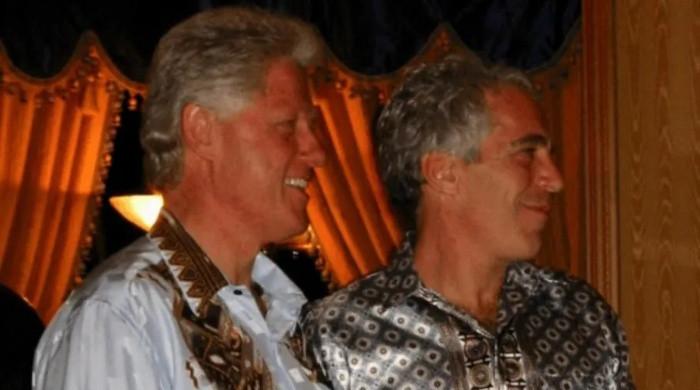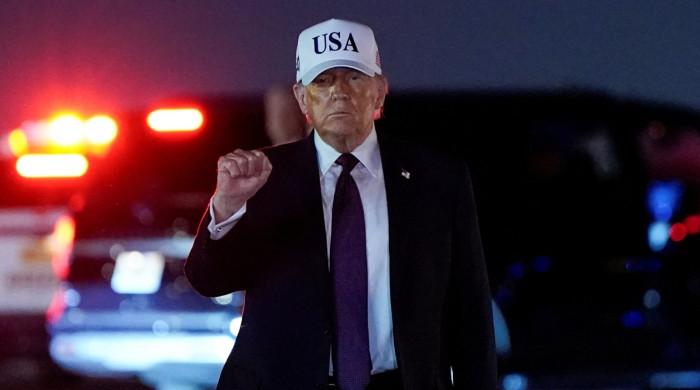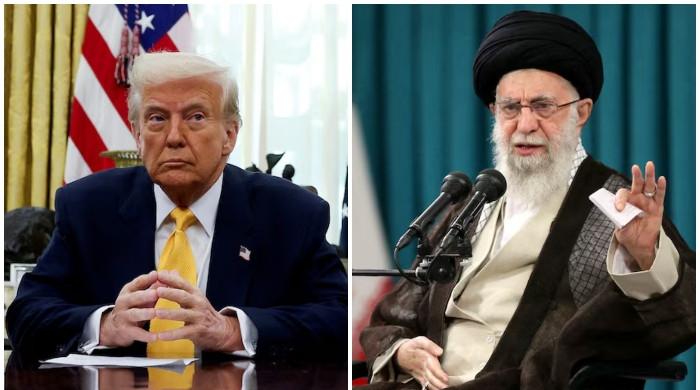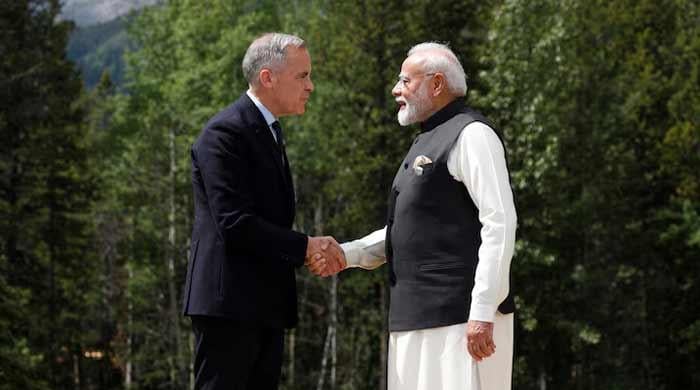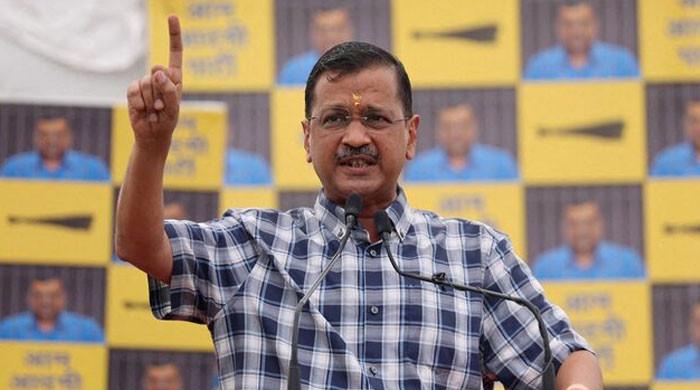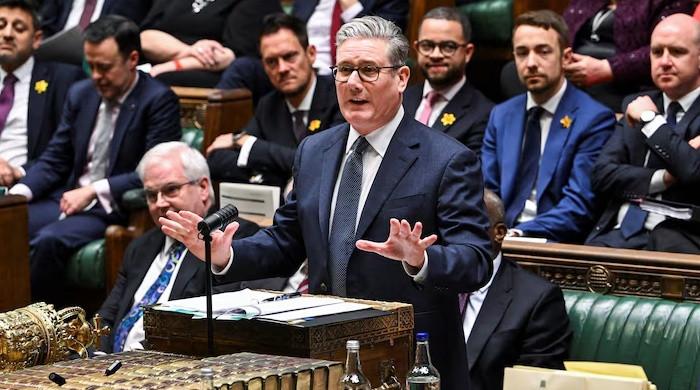Elon Musk's clash with Trump puts SpaceX's missile shield role in jeopardy
Pentagon “has no announcements regarding future contracts associated with Golden Dome effort," says official
June 13, 2025
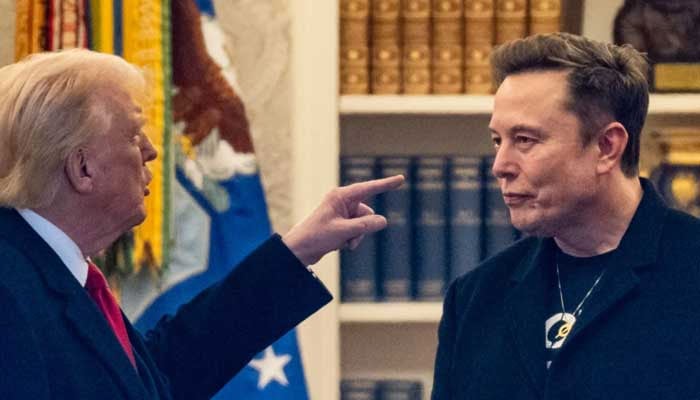
WASHINGTON: A heated fallout between Elon Musk and President Donald Trump has raised doubts about SpaceX’s role in a major US missile defence project called Golden Dome.
According to three people familiar with the plan, the government is now considering reducing Musk’s company’s involvement following the public row.
The White House until recently had considered a plan for SpaceX, Musk's rocket and satellite venture, to partner with software maker Palantir and drone builder Anduril to construct crucial elements of the project, dubbed Golden Dome. The administration had instructed the Pentagon to prioritise a network of satellites for the purpose, these people said.
But a new framework for the system, which would seek to track and prevent possible missile attacks against the United States, is now being considered that could reduce the role of SpaceX. One possibility, the three people said, could initially forgo SpaceX's satellite capabilities and focus on the expansion of existing ground systems for missile defence instead.
In a statement, a White House spokesman said: “The Trump Administration is committed to a rigorous review process for all bids and contracts.” A senior Defence Department official said the Pentagon “has no announcements regarding future contracts associated with the Golden Dome effort.”
SpaceX, Anduril and Palantir did not respond to requests for comment.
A reduced role for SpaceX would represent the first known setback to Musk's huge volume of business with the US government since his break with Trump last week. The shift in plans, especially for a project that Trump has touted as paramount for US defence strategy, also underscores the highly personalised nature of the president's leadership, aerospace and defence experts said.
“That people guiding the programme or building it are approved based on their political affiliation signals a real concern that the project itself is very politicised and not being conducted on the technical merits,” said Laura Grego, a missile defence expert and research director at the Union of Concerned Scientists, a non-profit based in Cambridge, Massachusetts.
In its statement to Reuters, the White House said any decision would be made “prioritising the best deal for America and leveraging the most advanced and innovative technology.”
Trump in May said the defence shield should be operational by the end of his presidency, January 2029. But industry experts have said that timeframe, and a projected cost of some $175 billion, could be too optimistic.
The change in the proposed “architecture” of the system, the three people said, could have the political advantage of allowing the current administration to deliver at least a portion of it. It is not clear how soon a final decision on the project could come or whether the ultimate role of any company, including SpaceX, has been determined.
Trump's efforts to roll out the project fast have led to uncertainty about the project's details and a scramble by contractors to be involved, industry experts and some of those involved in its development told Reuters. “To this day, no one knows what the requirements are,” said one of the people familiar with the process. “There isn't a coordinated effort with a true vision. All of these companies are just grabbing at this pot of money.”
SpaceX, Anduril and Palantir were all founded by entrepreneurs who have been major political supporters of Trump. The three companies had previously met with top administration officials and decision-makers from the Defence Department to discuss Golden Dome, according to people familiar with those discussions.
Before his high-profile falling out with the president, Musk served as a key Trump adviser and donated more than a quarter of a billion dollars to help elect him. But the recent dispute, which included Musk calling for Trump's impeachment and accusing the president of improper involvement with disgraced financier and sex offender Jeffrey Epstein, triggered the change in direction, the three people told Reuters.
“Because of the blow-up, the Pentagon has been given the space to look at other alternatives,” one of the people said.
In recent days, Musk has sought to temper the dispute, saying he regretted some of his comments and taking down some of his social media criticism of Trump, including the call for impeachment. Earlier this week, Press Secretary Karoline Leavitt told reporters that Trump appreciated Musk's apology and that she was unaware of any administration efforts to review Musk contracts because of the dispute.
Reuters could not determine whether Musk's conciliatory overtures might improve SpaceX's chances of winning Golden Dome contracts or securing further new business with the US government.
SpaceX had pitched for a part of the Golden Dome initiative called the “custody layer,” a constellation of between 400 and 1,000 satellites that would detect missiles, track their trajectory, and determine if they are heading toward the US, Reuters reported in April. In a January 27 executive order, Trump mandated the selection of a proposed “architecture” for Golden Dome and an implementation plan by the end of March.
The order called a missile attack “the most catastrophic threat facing the United States.”




